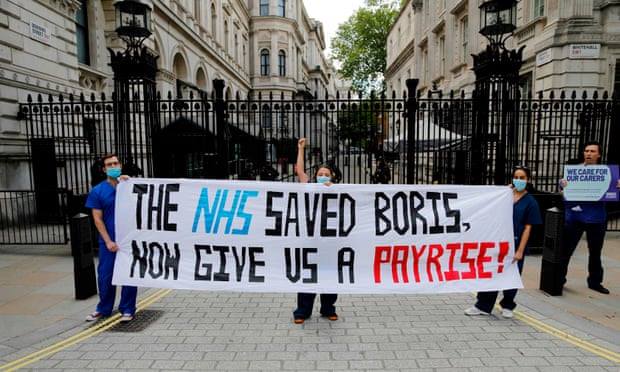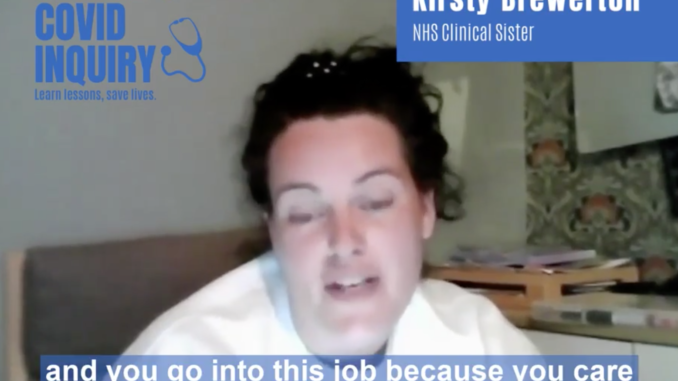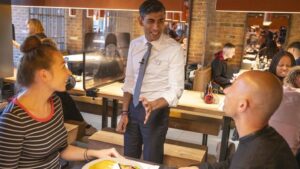
It’s becoming increasingly clear that the Government has no intention of holding an inquiry into its handling of the COVID-19 pandemic any time soon, which is why the People’s Covid Inquiry being held by Keep Our NHS Public is so important.
We are over half way through now, and already many suggestions have been made for measures that could be taken to reduce infections and deaths from COVID-19 in the UK, now.
-
Provide adequate financial support for people who need to isolate
Adequate financial support is needed not only for people who have COVID-19 symptoms, but for the people they have come into contact with and their households. If it is not suitable for people to isolate at home then accommodation needs to be provided.
In the first wave of the pandemic bus drivers were three times more likely to catch COVID-19 than the general population, but the fifth session of the People's Covid Inquiry heard that many were coming into work despite having COVID-19 symptoms as they couldn't afford not to.
The fact that the inability to isolate due to financial constraints is affecting many workers became apparent last summer when a Department for Health study showed that just 18% of people who had been told to isolate did so. The test and trace support payment is just £500 for a 10 day isolation period and was only extended to parents of children told to self-isolate from last month in March 2021. It needs to be made easier to obtain, and not means-tested, but a universal payment for anybody affected.
-
Provide mental health support for frontline workers
The risk of 'moral injury' to NHS staff was explored in the fifth session of the People's Covid Inquiry by NHS clinical sister Kirsty Brewerton. Moral injury is caused by people being forced into situations where they are unable to act according to their own conscience. She argued that an inability to provide adequate care to patients during the COVID-19 pandemic caused her and other staff moral injury that had led to mental health problems.
She highlighted that there was a lack of training and support to deal with the stresses of the job, which were exponentially exacerbated in the pandemic.
She told the Inquiry that requiring the NHS to provide a minimum amount of mental health support should be a priority:
"We had PPE, but with regards to PTSD there was a very obvious lack of protection. With mental health it is perhaps more subtle and it is not thought about straight away. We're not trained to deal with these types of situations, we're not routinely risk assessed to deal with mental illness or stress.
“Mental health support is sporadic and varies from trust to trust, there's no minimum amount of support that should be available and there is a duty of care required, it's a stressful job which is getting ever more stressful, and addressing it should be a priority."
-
Bring find, test, trace, isolate and support into public ownership to be carried out by local teams
The failure of SERCO's trace and trace and the privately-run and developed NHS Covid app have been apparent for some time, with just 55% of people who had been in contact with people who had tested positive for COVID-19 being told to isolate last summer.
What's more, this failure would have been entirely avoidable if the local providers of tracing services who already had been used.
The People's Covid Inquiry heard from Janet Harris from Sheffield Community Contact tracers speaking at session three of the People's Covid Inquiry. They carried out a pilot to find out how successful a locally run service provided by volunteers to help people who had to isolate could be.
Keep Our NHS Public campaigners in Oxford are calling on others to Crush Covid by getting motions passed by their local trade unions, constituency Labour Party meetings and local councils to bring test and trace services into local control.
-
Bring public transport into public ownership
Key workers have needed to access public transport throughout the pandemic and still do. As the vaccine-rollout continues and the Government remains hellbent on 'sending people back to the office' that need is only going to increase.
COVID-19 spreads in crowded, unventilated settings which are unavoidable on many forms of public transport. Our People's Covid Inquiry heard that Transport for London had inappropriately implemented a strike contingency plan when problems with overcrowding during the first lockdown became apparent because they simply weren't prepared for a pandemic. This action actually resulted in further overcrowding and exposed employers’ inability to deal with the pandemic.
-
Pay justice for NHS staff
Doctors and nurses warned at the fifth session for the People's Covid Inquiry, that the poor treatment of staff alongside the insulting 1% pay rise proposal, could worsen staff retention and the nursing shortage.
One NHS emergency medicine consultant, Dr Chidi Ejimofo warned that he knew of nurses who were already planning their exit while others warned nurses were increasingly unable to work due to impact on mental health.
The Government's 1% pay proposal has even been criticised by its own NHS Providers which represents employers in the health service, as it had assumed it should offer three times that.
-
Put NHS healthcare professionals in charge of 111
The second session of the Inquiry heard GP Dr Helen Salisbury criticising the "side-lining and ignoring" of GPs at the beginning of the pandemic when patients with COVID-19-related inquiries were directed to the 111 helpline. "An awful lot of 111 callers were hired in a hurry and didn't get much training, and I have an awful feeling that if some of those patients had been passed on to their GPs or had been passed onto their GPs earlier then we could have saved some lives," she said.
The first session of the People's Covid Inquiry heard from Jo Goodman from Bereaved Families For Justice that many people had died after being told to stay at home when they had needed to go to hospital to receive treatment after calling 111 for advice.
The NHS 111 number replaced NHS Direct in 2014, which had been staffed by healthcare professionals including doctors and nurses who were considered better able to provide health advice and signposting over the phone. Bringing back NHS healthcare professionals to provide the 111 service now, could avoid further COVID-19 deaths due to inappropriate advice being given out to patients.
-
Strengthen mask guidance
The World Health Organisation (WHO) issued guidance that wearing masks could reduce COVID-19 transmission in community settings based on observational data in June 2020. Shortly afterwards Rishi Sunack was shown at a press photo opportunity serving customers taking part in his Eat Out To Help Out scheme without a mask on, undermining scientific advice yet again.
While the WHO had specifically called for three-layer fabric masks to be used as standard, when the Government finally did start to promote mask use in the UK, it did so with a video clip on social media that showed people wearing incorrect types of mask.
Our People's Covid Inquiry has heard that mask use to reduce COVID-19 transmission needs to go further. Professor Raymond Agius told the fifth session of the People's Covid Inquiry that: "the airborne transmission of the virus has been grossly underestimated."
He recommended using FFP3 masks as standard over surgical masks in the workplace.
-
Make places of work and education safe before people return
Mixed messaging from the Government has led to confusion over workplace safety. While the Government is keen to 'get people back into the office' the People's Covid Inquiry has heard that getting workplaces safe for key workers took too long and guidelines are still unclear. At the fifth session the People's Covid Inquiry heard that workplace risk assessments for tube drivers did not appear until June 2020. This was partly due to employers not being aware of the scale of the risk assessment and mitigation that they needed to undertake to protect staff from COVID-19.
Professor Raymond Agius went on to suggest that individual workplaces should have safety committees that carry out risk assessments for the staff working in them.
-
Quarantine for all overseas travellers
While the Government has introduced some requirements for people to isolate upon arrival in the UK in recent months, these arguably came a year too late. They also have too many loopholes, such as the 'Stanley Johnson clause' that lets people travel to second homes overseas.
Professor Michael Baker Department of Public Health, University of Otago, New Zealand and member of New Zealand's Covid Technical Inquiry Group told the third session of the People's Covid Inquiry that efforts to suppress the virus had worked in countries where they were implemented. This had included introducing a two week quarantine for all new arrivals, as well as restrictions on the number of arrivals into New Zealand within a couple of days of the need becoming clear.
-
Don't undermine the vaccination programme
From Dominic Cummings' lockdown trip to Barnard Castle to Boris Johnson shaking the hands of covid patients in hospitals, the Government has undermined basic scientific advice to reduce COVID-19 infections from the start. The only success delivered by the Government to date has been the vaccination programme which has already caused infection rates to drop among those who have been vaccinated. It is important to note it is being delivered by NHS staff rather than private companies.
But the vaccination programme isn't yet over. The Government must ensure the vaccination programme continues at pace and the most vulnerable, people in hospitals and in care homes as well as young people, are not left behind. There also needs to be clarification over vaccine advice and availability for women under 30 following the discovery of specific risks for that group.
Rather than chasing headlines about total numbers of people vaccinated, the Government must follow the science with regards to vaccination schedules which are still being refined and deliver vaccine equity that protects the people who need them most.








Leave a Reply